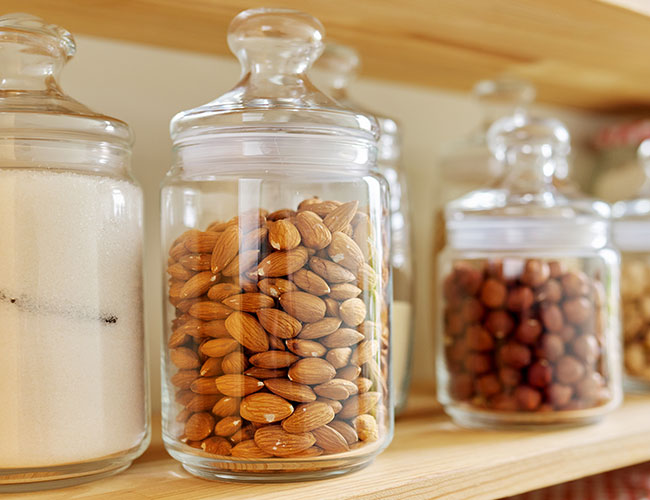Almonds
When you think of traditional smoothie ingredients, a few common options may come to mind. Maybe you picture fruits like bananas and berries, healthy greens like spinach, or the liquid components like juice and milk. But Lee offers one metabolism-boosting addition that may surprise you. "The one metabolism-boosting ingredient that I'd recommend you include would be almonds," she says.
It turns out that this delicious nut is packed with all the best traits of a metabolism-boosting food. "Almonds contain the perfect combo of protein, healthy fats, and fiber," Lee explains.
If you're looking to boost your metabolism, it's always important to get enough protein, which almonds offer a lot of. "Although temporary, protein intake can lead to increased metabolism," Lee says. "Because protein takes longer to be used and absorbed, it has a higher thermic effect compared to fats and carbohydrates. Plus protein can help preserve muscle mass and keep your metabolism at its peak."
Luckily, almonds and other nuts are a great high-protein addition to your smoothie. "High protein content of nuts helps our bodies use more calories to digest them," Lee notes.
But the metabolism-boosting benefits of these nuts don't stop there. "They can also keep your blood sugars very stable because they are a low-glycemic food," Lee goes on. "Another plus, almonds contain some antioxidant properties from Vitamin E." Sounds like the perfect smoothie ingredient to us!
To incorporate almonds into your morning smoothie, Lee offers a tasty recipe. Blend 1 cup of strawberries, 1 small frozen banana, 1 1/2 tbsp almond butter, 1 tbsp flax seeds, and 1 1/2 cup sweetened almond milk. Then, you've got yourself a delicious, metabolism-boosting breakfast.
When it comes to boosting your metabolism through diet changes, Lee has a few final words of advice: make sure you're consuming enough calories. If you put yourself on a highly restrictive diet, your body goes into what she calls "survival mode." At this point, it will seek energy from other sources, like your muscles. "When it gets into this survival mode of trying to reserve energy stores from the minimal nutrients you're feeding your body, your metabolism slows," she explains. That means you'll be hungry, fatigued, and dealing with a slower metabolism.
"That's why looking at fiber, protein, and healthy fat intake for satiety and nutrients may have a bigger impact on metabolism than just one single food," Lee concludes. Got it!


